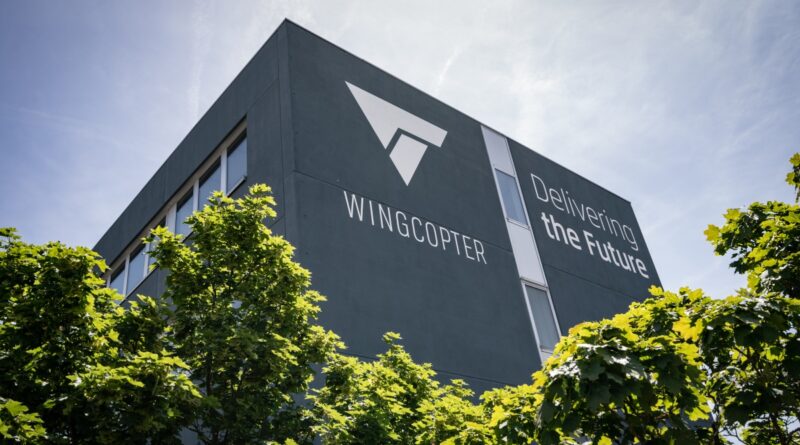Wingcopter, Germany’s drone delivery startup, raises another $44M from the EIB
Wingcopter, a startup out of Germany that has made a name for itself in the world of delivery drones used primarily for delivery of medicine and other goods to remote areas, has picked up some more financing to expand its business. The European Investment Bank is putting €40 million (close to $44 million) into the startup, funding that it will use in two areas: further developing its hardware line; and to kick off a new business in logistics and delivery services, anchored by a fleet of its drones.
The funding is being described as “quasi-equity” — and it’s a common approach taken by the EIB (other examples here and here) that involves one portion of the funding coming in as equity and the rest as a venture loan. Tom Plümmer, Wingcopter’s CEO and co-founder, would not disclose the proportions of either in an interview. He said the plan is to raise a significant Series B next year — or whenever the markets turn around.
For now, this latest infusion brings the total raised by Wingcopter to €100 million, which has also been backed in two previous fundraises by a mix of strategic and financial backers such as the retail giant REWE, Xplorer Capital, Japan’s ITOCHU, and Expa, the investment firm started by Garrett Camp of Uber.
And it more than doubles Wingcopter’s previous valuation — a figure that it is not disclosing, either. But if you consider that its bigger U.S. counterpart Zipline last month raised $330 million at a valuation of $4.2 billion, Wingcopter clearly sees the opportunity in the market — and given it has raised only around one-tenth the amount overall, where it likely is right now.
Image Credits: Wingcopter
Wingcopter’s raise is coming at a key moment in the wider vertical take-off and landing space overall. In addition to Zipline’s raise, just a week ago, the VTOL business Lilium, which is developing an air taxi business, disclosed that it was raising another $250 million, with $100 million committed so far from Tencent. The company is publicly listed in on NasdaqGS and its stock has been floundering and got a tiny bump from the news.
Indeed, in the more dicey financial waters of today, companies like Wingcopter, Zipline, and others in the space like Flytrex, have something that the air taxi businesses do not: active deployments, albeit small ones. The company has been working with Unicef in Malawi to help it deliver medicines to hard-to-reach areas, and the plan is to expand that service to more geographies and in more partnerships.
Wingcopter, like Zipline, has focused most of its efforts on the emerging region of Africa, and on very specific use cases.
While the company is still awaiting regulatory clearance to start pilots, and eventually services, in Europe, he said that he was approached by the German government to see if Wingcopter’s drones could help form part of the fleet of drones being sent to Ukraine to help it with its defense against Russia.
Wingcopter refused: the company, he said, is committed to its drones never being used in combat situations. That won’t rule out, however, potentially using them at some point to deliver goods when the fighting ceases and Ukraine becomes more focused on reconstruction.
In the meantime, the plan will be to expand business development into other emerging regions alongside Africa, including Asia and Latin America. And that is where the services element comes into the picture. To be clear, Wingcopter will continue to develop and sell drones to individual organizations as it has done up to now. In the wings is a hydrogen-powered model that will, Plümmer said, extend the range of its aircraft by five times compared to models that currently run on batteries. “We will do Frankfurt to Berlin on one charge,” he said.
But more realistically, the unit cost of Wingcraft’s models continues to be typically too high for the kinds of organizations that might be the most likely to use them, and so that is why the startup will also be looking at ways of providing services on top of fleets that it will lease out instead.
Currently, Wingcopter, in working with Unicef, uses a mixture of its own proprietary software on its own devices alongside ERP software from third parties like SAP. But the plan is to build its own logistics and delivery backend to manage this service and work with its fleet, and any other device that it might make sense to use for other legs of a delivery.
“We will integrate our existing drone software into a logistics system that we will design, and we will track the orders,” he said. “This is partly why Garrett [Camp] was interested in us. But yes, as a logistics provider we’ll need to be more platform agnostic and open. We want to build the best logistics service so we are looking at a combination of air and ground vehicles and we are open for more partnerships than we would have been as just a drone company.”
Part of the EIB’s mandate is to finance promising startups out of Europe to push forward the region’s technology industry, but another part is to invest in projects that further the region’s ecological mandates, which is the case here, since the use of drones not only reduces the amount of traffic and emissions from delivery vehicles, but also furthers the work being done to build more clean energy systems, as is the case with Wingcopter’s hydrogen-powered model that is currently in development.
“Europe is currently the global leader in cleantech, and we must work hard to maintain this lead. Backing European cleantech pioneers with global reach like Wingcopter is central to our mission,” said EIB VP Ambroise Fayolle, who oversees Germany, in a statement. “Electric cargo drones are an important vertical segment for a future of sustainable transport and logistics. This investment underlines our commitment to supporting entrepreneurs growing and building advanced green technology businesses in the European Union, strengthening our technological competitiveness, creating highly skilled jobs and opening up new markets, while preserving nature. We are proud to be supporting this European success story.”
Wingcopter, Germany’s drone delivery startup, raises another $44M from the EIB by Ingrid Lunden originally published on TechCrunch





